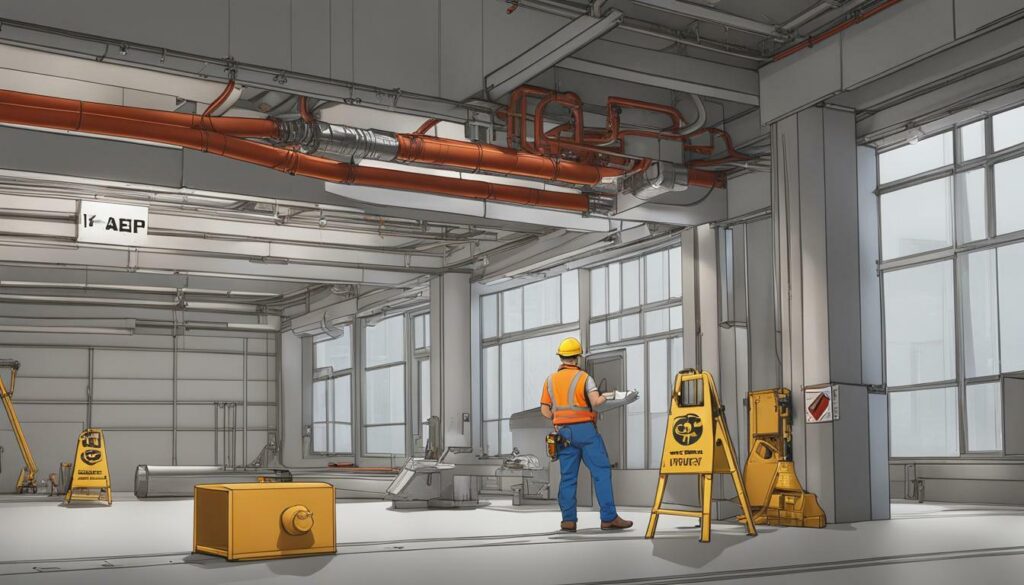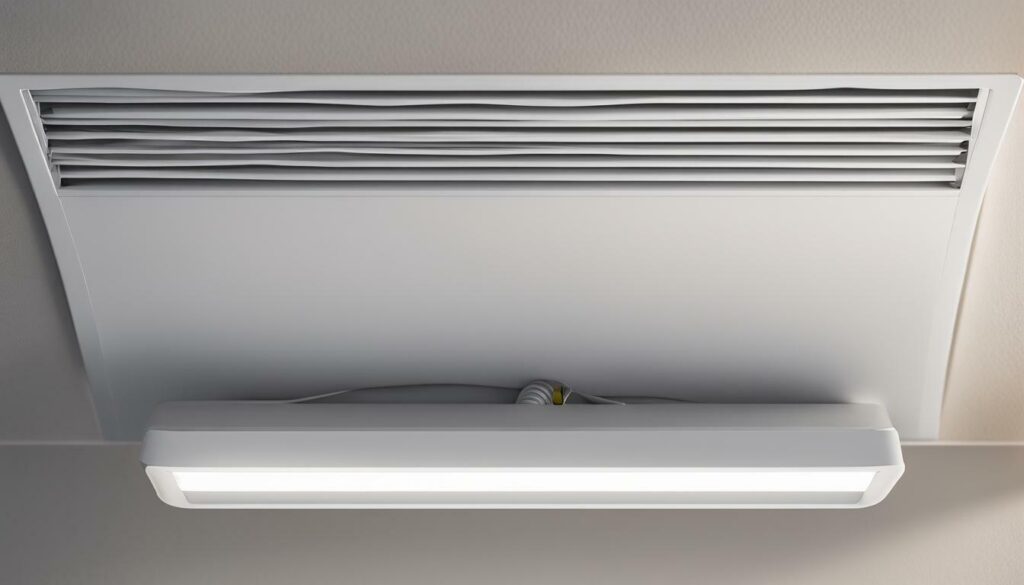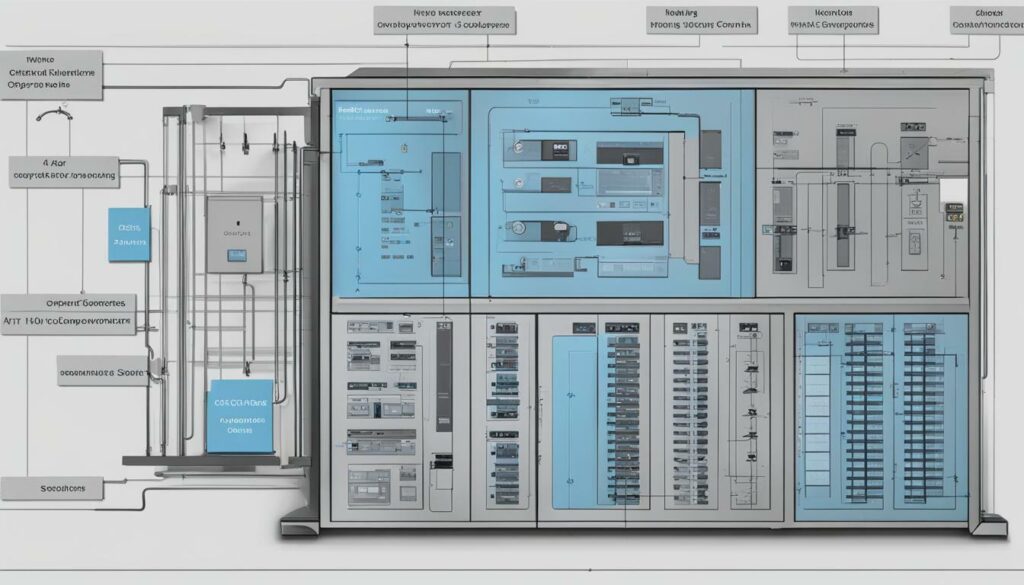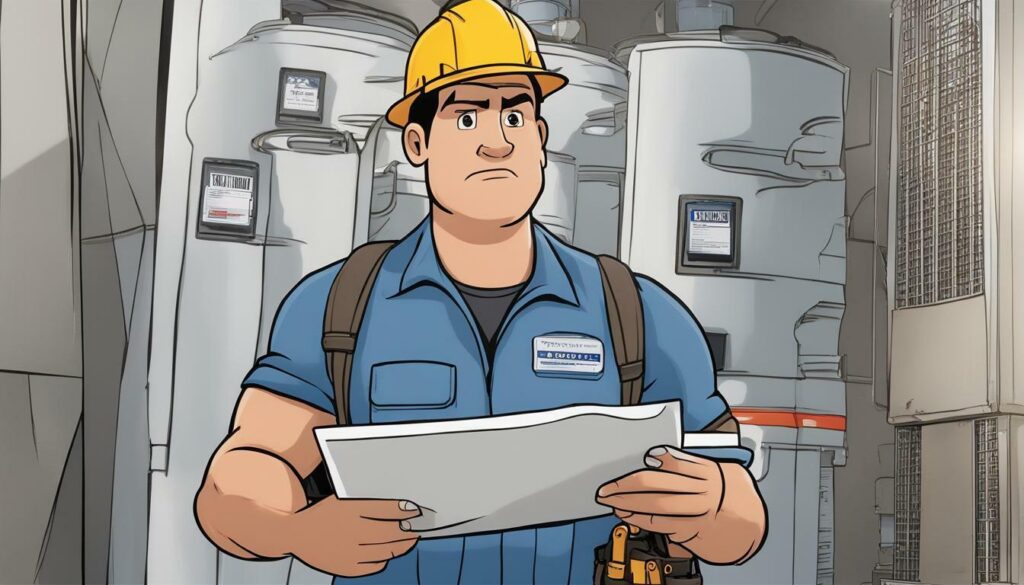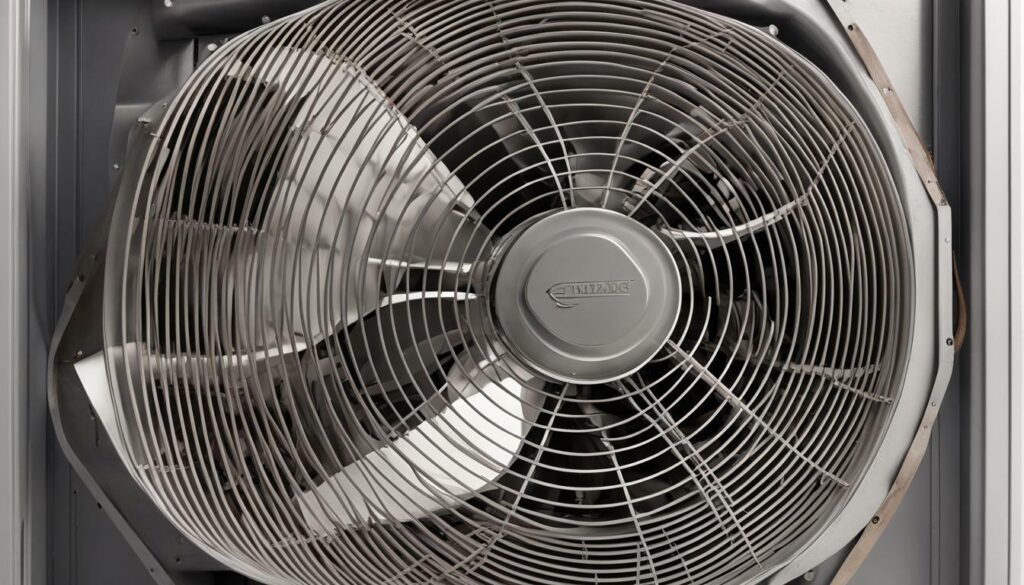If you’re planning to have HVAC work done on your property, it’s important to understand the process of pulling permits for HVAC work. HVAC permits are a critical part of the process that ensures your heating and cooling systems are installed and operated safely and compliantly with building codes.
Obtaining HVAC permits involves a series of steps that you should be familiar with before starting any HVAC work. These steps include submitting permit applications, providing necessary documentation, paying applicable fees, scheduling and passing inspections, and staying up-to-date on HVAC permit regulations.
Key Takeaways:
- Pulling permits for HVAC work is important for ensuring compliance with building codes and safety standards.
- The process includes steps such as submitting permit applications, providing documentation, paying fees, and passing inspections.
- It’s important to stay up-to-date on HVAC permit regulations and understand how to navigate the permit process effectively.
Why Are Permits Required for HVAC Work?
When planning HVAC projects, it’s important to understand the permit requirements for HVAC work. Pulling the appropriate permits ensures that the installation or repair of heating and cooling systems is up to code and poses no safety hazards to your property or others.
Permit requirements for HVAC work vary by state and local jurisdiction, but they’re typically in place to ensure that HVAC contractors follow HVAC permit regulations. These regulations aim to prevent substandard work, improper installations, and potential hazards to public health and safety.
The permit process also serves to verify that the work is being performed by a licensed contractor with appropriate training and experience in HVAC installations. By requiring permits, the authorities can ensure that HVAC work is in compliance with building standards and energy codes.
In addition, obtaining permits for HVAC installations or repairs can help you avoid future legal issues. Failing to obtain permits can lead to fines, penalties, and even delays in project completion. Therefore, it’s important to understand the permit requirements for your specific project and follow the proper procedures to avoid any legal consequences.
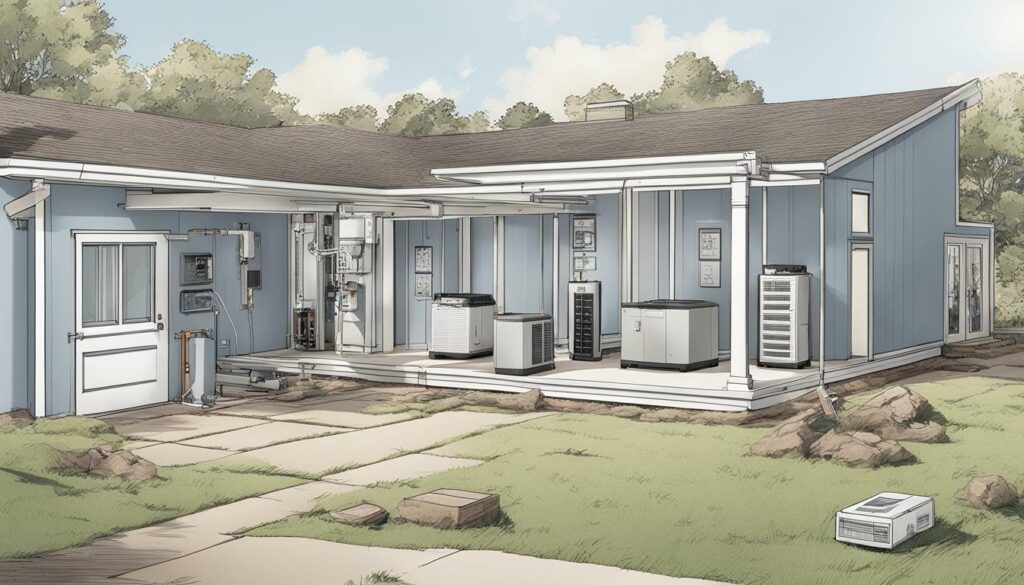

Ultimately, pulling permits for HVAC work promotes safety, compliance with regulations, and can help you avoid legal complications. It’s essential to understand why permits are required and follow the appropriate HVAC permit regulations to ensure a successful project outcome.
HVAC Permit Guidelines in the United States
When it comes to obtaining permits for HVAC installations in the United States, there are general guidelines that apply across the board. However, there may be specific requirements that vary depending on your state or local jurisdiction. It’s important to research the guidelines of your particular area to ensure compliance with the regulations.
In general, the HVAC permit process involves submitting an application and providing necessary documentation to the relevant authorities. This will typically include details on the nature and scope of the project, the location of the installation, and the qualifications of the contractor or installer.
The specific types of documentation required may include design plans, equipment specifications, and proof of insurance and licensing. It’s important to ensure that all information provided is accurate and up-to-date to avoid potential delays or rejection of the application.
Once the application is submitted, there will typically be a waiting period for approval. This may vary depending on the complexity of the project and the workload of the authorities processing the application.
In addition to obtaining the necessary permits, it’s also important to schedule and pass inspections throughout the project to ensure compliance with regulations. Depending on the jurisdiction, there may be different requirements for the number and timing of inspections, so it’s important to stay informed and plan accordingly.
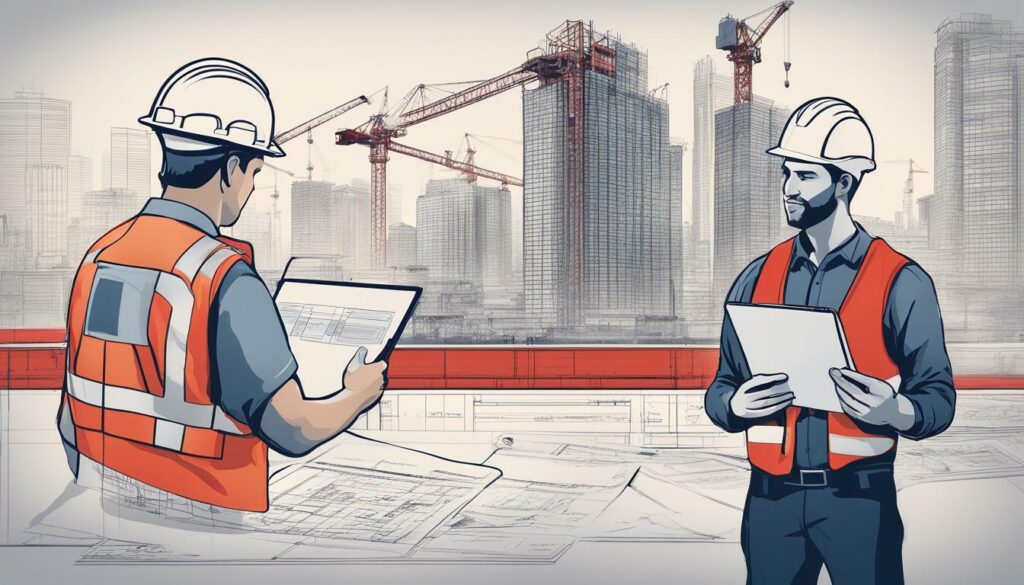

Overall, understanding the HVAC permit guidelines is an essential part of any HVAC installation project. By following the proper process and staying informed of any changes or updates to regulations, you can ensure a successful and compliant project that meets the necessary safety and building code requirements.
HVAC Permit Application Process
Now that you understand why permits are necessary for HVAC work, it’s time to delve into the application process. To begin, you’ll need to obtain the necessary forms and documentation required by your local permitting office. This may include proof of ownership or permission from the property owner, detailed plans of the HVAC system, and a detailed scope of the project.
Once you have gathered all required documents, it’s time to fill out the application form. This form will ask for specific details about your project, such as the type of HVAC system you’ll be installing, the specific location of the installation, and the estimated cost of the project.
Be sure to fill out the application form as accurately and thoroughly as possible. Incomplete or inaccurate applications can lead to delays in processing and potential fines or penalties.
After completing the application form, you’ll need to submit it along with any required documents and fees. This can generally be done in person at the local permitting office or online through their website.
Once your application is submitted, it will be reviewed by the permitting office and inspectors will be scheduled to conduct necessary inspections throughout the project. It’s important to be available and prepared for these inspections in order to ensure compliance with regulations and avoid delays in the project’s completion.
Remember, the HVAC permit application process may vary by state or local jurisdiction. Be sure to consult with your local permitting office for specific guidelines and requirements.
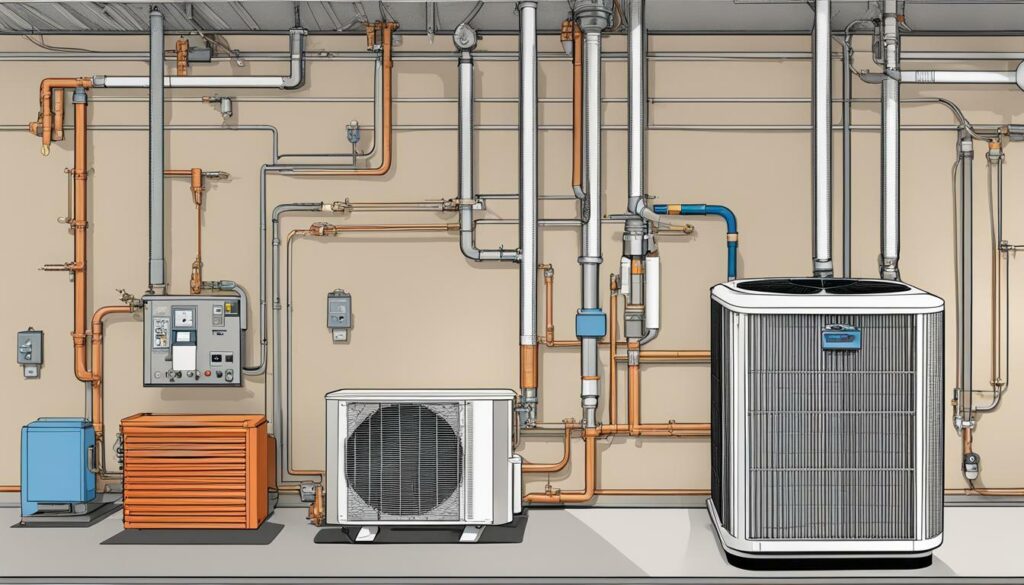

Understanding HVAC Permit Fees
When planning an HVAC project, it is important to consider the costs associated with obtaining the necessary permits. HVAC permit fees vary depending on the location and scope of the project, but they are typically required for any significant installation or modification of heating and cooling systems.
The purpose of HVAC permit fees is to cover the cost of regulatory oversight and ensure compliance with building codes and safety standards. Failure to obtain the necessary permits can result in legal consequences, including penalties and fines.
Factors that can influence the cost of HVAC permits include the size and complexity of the project, as well as the location and regulations of the local jurisdiction. Some permit fees may be a flat rate, while others may be calculated based on the value of the project or the number of units installed.
It is important to budget for HVAC permit fees as part of the overall project costs. Be sure to research the specific requirements of your local jurisdiction and work with reputable contractors who understand the permitting process.
To ensure a smooth permit application process, be sure to provide accurate information and all necessary documentation when submitting the application. This includes detailed plans and specifications for the HVAC system, as well as any required fees or payments.


By understanding the importance of HVAC permit fees and planning for them accordingly, you can ensure a successful and compliant project. Consult with local authorities or industry organizations for more information on the specific requirements in your area.
The Role of Inspections in HVAC Permit Process
Obtaining permits for HVAC installations involves more than just submitting an application and paying a fee. Inspections play a vital role in ensuring compliance with regulations and safety standards. Without passing inspections, your HVAC project may not be able to move forward.
Inspections are typically conducted by a building inspector or a representative from the local government. These inspections may occur at various stages of the project, such as before installation, during the installation process, and after the project is completed.
During inspections, the inspector will check to see that the HVAC work is being done in accordance with local building codes and regulations. This may involve checking the ductwork, the ventilation system, the wiring and electrical components, and other related aspects of the installation.
If any issues are found during the inspection, they must be corrected before the project can move forward. This may include making changes to the installation plan or fixing any safety hazards that may have been identified. Once the necessary changes have been made, the inspector will return to ensure that everything is up to code and that the project is ready to move forward.
Passing inspections is crucial for obtaining permits for HVAC installations. Not only does it ensure compliance with regulations, but it also helps to ensure that the project is safe and operational. By understanding the role of inspections in the HVAC permit process and working closely with inspectors and contractors, you can maximize your chances of a successful project.


Common Challenges in Obtaining HVAC Permits
As you navigate the permitting process for your HVAC project, you may encounter various challenges that can make the process frustrating and time-consuming. However, with the right strategies and resources, you can overcome these challenges and obtain the necessary permits. Here are some common challenges you may face and how to tackle them:
- Understanding local regulations: Permitting requirements can vary by state and local jurisdiction, and keeping up with the latest changes can be overwhelming. To overcome this challenge, do your research and consult with local authorities or industry experts who can guide you through the process.
- Working with reputable contractors: Choosing the right HVAC contractor is crucial for a successful project and obtaining the necessary permits. However, not all contractors are created equal and working with an inexperienced or unlicensed contractor can pose a significant challenge. To avoid this, do your due diligence and check the contractor’s licensing, insurance, and references before hiring them.
- Submitting accurate and complete permit applications: Incomplete or inaccurate permit applications can lead to delays and even rejections. To overcome this challenge, ensure you have all the necessary documentation and information required for the permit application, double-check your application for accuracy, and submit it in a timely manner to avoid any delays.
- Dealing with unexpected costs: HVAC permit fees can vary depending on the scope of your project and location. To avoid unexpected costs, do your research and budget accordingly. This way, you can plan for the cost of the permits and avoid delays or additional expenses.
By understanding and planning for these common challenges, you can ensure a smoother and more efficient permitting process for your HVAC project. Remember to stay organized, communicate effectively with contractors and authorities, and seek professional guidance when needed. With these strategies in place, you can successfully navigate the permitting process and get your HVAC project up and running.
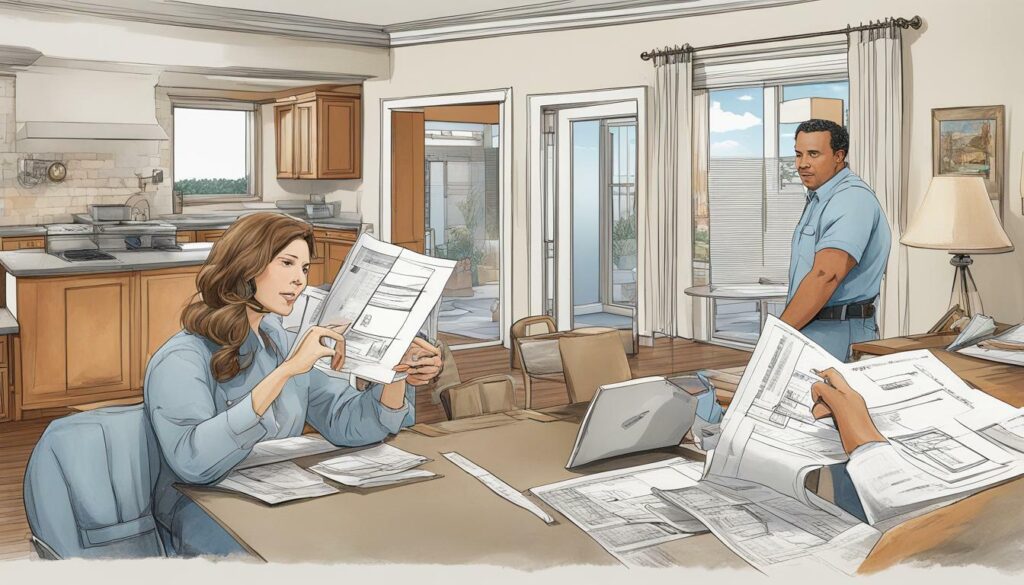

Legal Consequences of Failing to Pull HVAC Permits
Did you know that failing to pull HVAC permits can result in legal consequences? Not only are you risking the safety of your building and its occupants, but you could also face penalties, fines, and potential delays in project completion. That’s why it’s crucial to follow the proper permitting process for HVAC work.
When you skip the permit process, you’re essentially breaking the law and opening yourself up to legal action. Even if your installation or repair job goes smoothly and without incident, you’ll have no legal protection if something goes wrong down the line. Should a fire or other disaster occur, the lack of permits, documentation, and inspections could result in liability issues.
Additionally, if you’re caught working without proper permits, you’ll likely face fines and penalties. These can vary depending on your location and the scope of the project, but they can quickly add up and impact your bottom line. You may also be required to stop work until the proper permits are obtained, which can cause costly delays and frustration for everyone involved.
Don’t risk legal consequences by failing to pull HVAC permits. Stay compliant with regulations and ensure the safety and success of your project by following the proper permitting process.
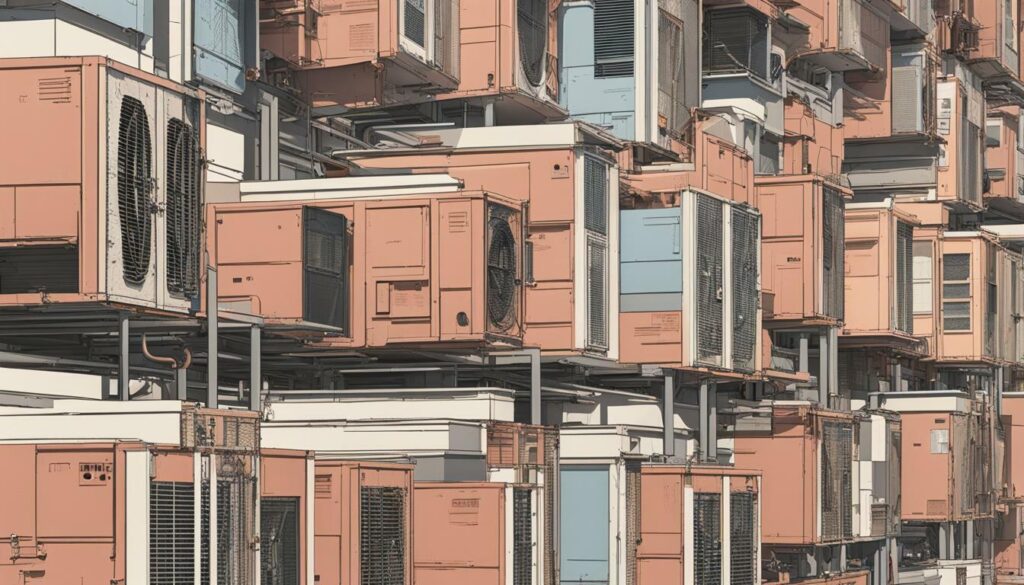

Resources for Navigating HVAC Permitting
Obtaining permits for HVAC installations can be a complex process, but there are various resources available to help you navigate it. The first stop is your local building department, which can provide information on specific requirements and permit fees. Many states and cities also have online portals for permit applications and payments.
You can also consult industry organizations like the Air Conditioning Contractors of America (ACCA) and the Sheet Metal and Air Conditioning Contractors’ National Association (SMACNA) for guidance on HVAC permit regulations. These organizations offer comprehensive resources for contractors and home and building owners, including forms, checklists, and training programs.
Government agencies like the Environmental Protection Agency (EPA) and the Occupational Safety and Health Administration (OSHA) also provide essential guidelines and regulations related to HVAC installations. By consulting these resources, you can ensure that you are complying with all necessary regulations and avoiding potential legal consequences.
Keep in mind that permits for HVAC work can vary by state and local jurisdiction, so it’s essential to do your research and stay informed. Subscribing to relevant newsletters or attending industry events can also be an excellent way to stay up-to-date on any changes or updates to HVAC permit regulations.
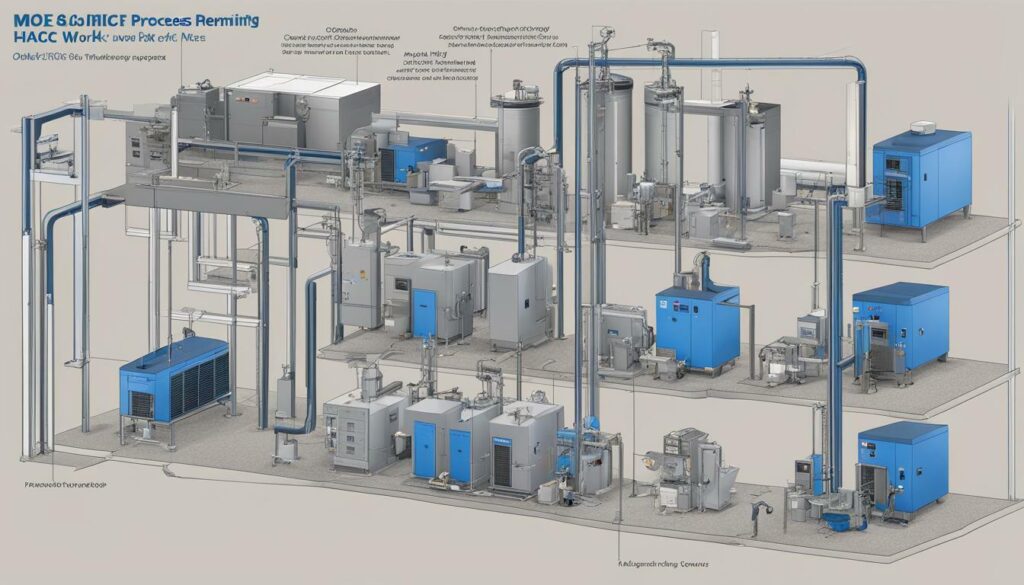

By utilizing these resources effectively, you can streamline your HVAC permit process and avoid costly mistakes. Don’t hesitate to reach out to professionals if you need additional guidance or support. With the right tools and knowledge, you can ensure a smooth and successful HVAC installation project.
Best Practices for Smooth HVAC Permitting
If you want to ensure a smooth HVAC permit process for your project, there are several best practices to follow. By taking the time to plan ahead and proactively manage your permits, you can avoid delays, fines, and other consequences of non-compliance with HVAC permit regulations.
Communicate Clearly with Contractors and Authorities
One of the most important elements of a successful HVAC permit process is clear communication. Make sure that all contractors and authorities involved in your project are aware of the necessary permits and understand the timeline for obtaining and fulfilling them. Keep lines of communication open throughout the project to address any concerns or questions that may arise.
Stay Organized throughout the Project
Effective organization is key to managing your HVAC permit process efficiently. Keep all permit-related documents and communication in one place, and make sure that all deadlines and requirements are clearly marked on your calendar or project management tool. By staying organized, you can avoid missing critical deadlines or overlooking important details.
Plan Ahead and Be Proactive
Planning ahead is essential to a successful HVAC permit process. Make sure that you understand the permitting requirements for your project and begin the application process as early as possible. By being proactive, you can avoid rush fees and ensure that you have ample time to address any issues that may arise during the permitting process.
Work with a Reputable Contractor
Choosing the right HVAC contractor is crucial to a successful permit process. Make sure that you choose a contractor with a proven track record of compliance and experience with the permit process. A reputable contractor can help ensure that your project meets all necessary regulations and requirements.
Schedule and Pass Inspections on Time
Inspections are a critical part of the HVAC permit process, and scheduling and passing them on time is essential to compliance. Make sure that you understand the inspection requirements for your project and schedule them as early as possible. Work with your contractor to ensure that your project is ready for inspections, and address any issues as quickly as possible to avoid delays.
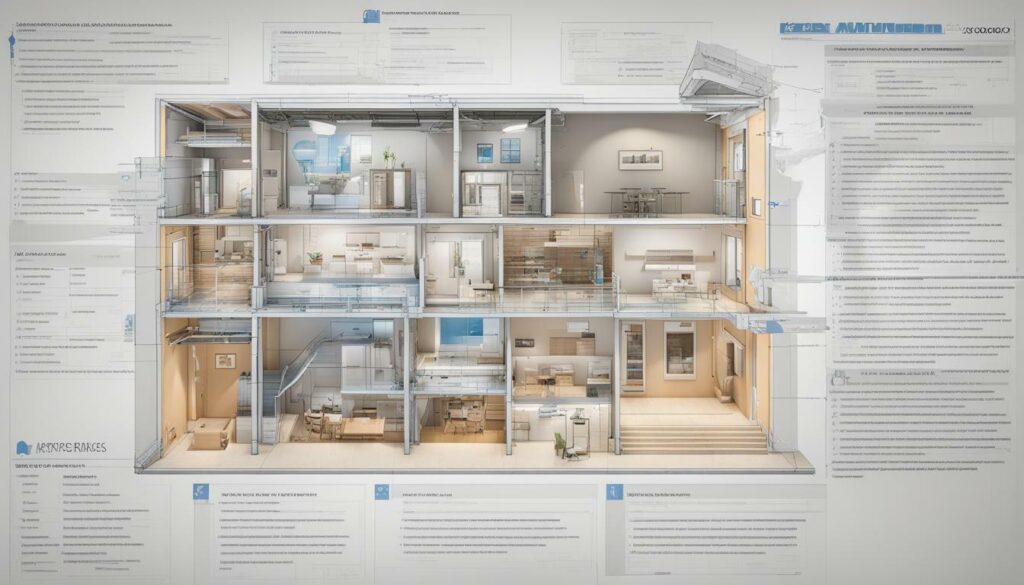

Following these best practices can help ensure a smooth HVAC permit process for your project. By planning ahead, staying organized, and maintaining clear communication, you can avoid the hassle and expense of non-compliance with HVAC permit regulations.
Staying Updated on HVAC Permit Regulations
As you navigate the HVAC permitting process, it’s crucial to stay up-to-date on the latest regulations. HVAC permit regulations can change over time, so it’s important to consistently educate yourself and adjust accordingly.
One way to stay informed is by subscribing to relevant newsletters or industry publications. These resources can provide updates on new regulations or changes to existing ones.
Another helpful strategy is attending industry events or workshops. These events provide an opportunity to network with other professionals and learn from experts in the field. You may also gain insights on new tools or technologies that can streamline the HVAC permit process.
Additionally, keep in mind that regulations can vary by state or local jurisdiction. Make sure to check with your local building department or permit office for any updates or changes that may impact your project.
By staying proactive and informed on HVAC permit regulations, you can ensure your compliance and mitigate any potential roadblocks in the permitting process.
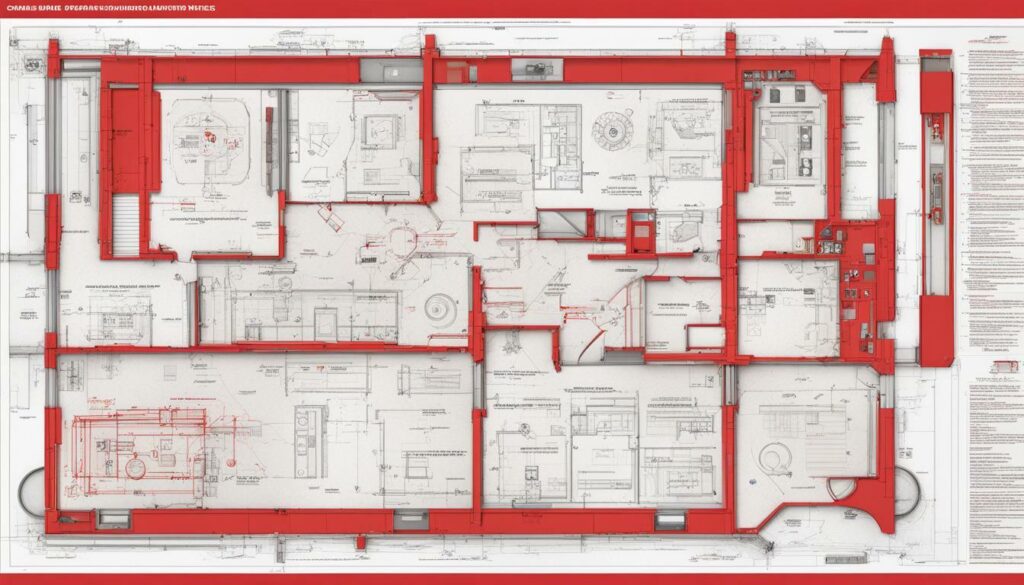

Conclusion
Congratulations, you’ve now gained a solid understanding of the process of pulling permits for HVAC work. By following the necessary steps, you can ensure compliance with building codes and regulations, and safeguard the safety and efficiency of your heating and cooling systems.
Remember, permits are required for most HVAC installations and replacements, and failing to obtain them can result in legal consequences. By staying organized, communicating with contractors, and staying up to date on regulations, you can ensure a smooth and successful project.
Don’t forget to utilize the resources available to you, such as government agencies and industry organizations, to help navigate the HVAC permitting process. And always stay proactive in complying with regulations and ensuring smooth project management.
FAQ
Q: Why are permits required for HVAC work?
A: Permits are required for HVAC work to ensure safety, compliance with building codes, and proper installation and operation of heating and cooling systems.
Q: What are the HVAC permit guidelines in the United States?
A: The HVAC permit guidelines in the United States include submitting permit applications, providing necessary documentation, and paying applicable fees. Specific guidelines may vary by state or local jurisdiction.
Q: How do I apply for HVAC permits?
A: To apply for HVAC permits, you need to accurately fill out the application form, provide the required documentation, and submit the application to the appropriate authority. It’s important to follow the step-by-step process to ensure a smooth application.
Q: What are HVAC permit fees?
A: HVAC permit fees are the costs associated with obtaining permits for HVAC work. The fees can vary depending on the scope of the project and the location. It’s important to budget for these expenses.
Q: What is the role of inspections in the HVAC permit process?
A: Inspections play a crucial role in the HVAC permit process. They ensure compliance with regulations and typically involve an assessment of the installation or modification of heating and cooling systems. Scheduling and passing inspections are important for project success.
Q: What are common challenges in obtaining HVAC permits?
A: Common challenges in obtaining HVAC permits include understanding local regulations, working with reputable contractors, and navigating the permit process. It’s important to seek professional guidance when needed and be aware of potential roadblocks.
Q: What are the legal consequences of failing to pull HVAC permits?
A: Failing to pull HVAC permits can lead to legal consequences, including penalties, fines, and potential delays in project completion. It’s important to follow the proper permitting process to avoid these risks.
Q: What resources are available for navigating HVAC permitting?
A: There are resources available to help navigate the HVAC permitting process. Websites, government agencies, and industry organizations offer guidance, forms, and useful information. It’s important to utilize these resources effectively.
Q: What are the best practices for smooth HVAC permitting?
A: Best practices for a smooth HVAC permitting process include proper planning, effective communication with contractors and authorities, and staying organized throughout the project. Proactive permit management can lead to project success.
Q: How can I stay updated on HVAC permit regulations?
A: Staying updated on HVAC permit regulations is important. Regulations can change over time, and it’s crucial to stay informed. Consider subscribing to relevant newsletters or attending industry events to keep up with the latest developments.

